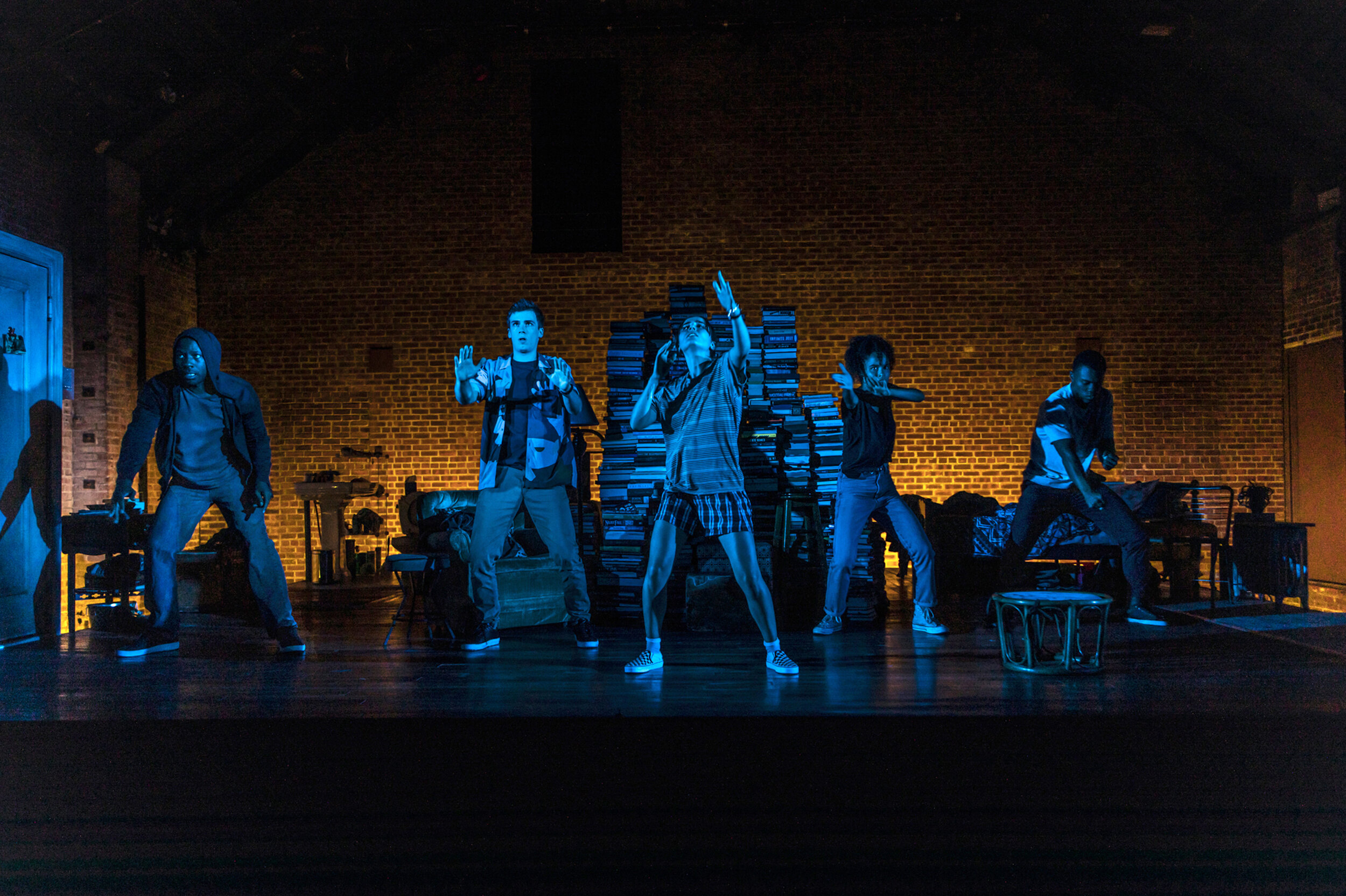REVIEW: Jack Thorne’s “Sunday” at Atlantic Theater Company
Christian Strange, Sadie Scott, Ruby Frankel, Zane Pais, and Juliana Canfield in “Sunday”. Photo Credit: Monique Carboni.
While attending playwright Jack Thorne (“Harry Potter and the Cursed Child” and the Old Vic’s “A Christmas Carol”)’s listless, shapeless, and dreadful new play “Sunday” at Atlantic Theater Company, I could not help but keep thinking of a popular Internet meme from the sitcom “30 Rock” in which actor Steve Buscemi dons a backwards baseball cap and a T-shirt that says “Music Band” while walking through the halls of a high school, skateboard in tow, and saying: “how do you do fellow kids?”
This play, the product of a 40-year-old British playwright, supposedly set in present-day New York among a group of Generation Z-aged recent college graduates exudes that same, obviously false “how do you do fellow kids?” energy.
At its core, “Sunday” offers an unconvincing portrait of a specific milieu within a specific generation—a clique of urban, liberal arts graduates assembling for book group, a regular ritual in which big ideas are explored in a hostile environment of petty barbs, cocaine snorting, and designated dance and phone breaks shared over store-bought guacamole and hastily assembled cocktails.
The play is omnisciently narrated by Alice (Ruby Frankel), a peripheral member of this book group who doesn’t actually seem to like or get along with any of its members—most of whom she’s apparently known since their prep school upbringing—but its protagonist is Marie (Sadie Scott), a Gen Z-er navigating the rocky road of post-graduate degree life (yet, somehow only 22), still in the midst of her own personal discovery, potentially in love with her roommate, Jill (Juliana Canfield), and newly fired from her publishing internship.
On one otherwise unremarkable Sunday night, Marie and Jill find it is their turn to host book group in their shabby fifth floor walkup apartment, and are joined by pill-of-the-year Alice; Jill’s boyfriend, and book group founder, the cocky and pampered Milo (Zane Pais); and Milo’s best friend, the earnest and smooth Keith (Christian Strange).
Maurice Jones, Zane Pais, Sadie Scott, JulianaCanfield, and Christian Strange. Photo Credit: Monique Carboni.
As the group spars over Anne Tyler’s 1982 novel “Dinner at the Homesick Restaurant”—a highly unlikely choice for a group of 20-somethings born in the late-1990s—the meaning of toxic masculinity (which, somehow, none of these “kids” can articulate despite it being a central concept of the zeitgeist), the question of their own morality, and Milo’s diagnosis of a culture of disappointment and self-pity, tension builds as select moments are inappositely punctuated by sequences of surprisingly low-energy movement choreographed by director Lee Sunday Evans, suggesting either the passage of time or something else I could not grasp.
A final, excruciatingly long scene features an encounter between Marie and her older, socially awkward downstairs neighbor, Bill (Maurice Jones), an aspiring sci-fi writer who essentially invites himself into her apartment at two a.m. for a stunted conversation that prompts Marie to offer him an ultimatum of three possible futures for their relationship (spoiler alert: this doesn’t end well for either of them).
Maurice Jones and Sadie Scott. Photo Credit: Monique Carboni.
A coda by Alice reveals how this seemingly uneventful night became the defining moment of Marie’s life (yawn), before sharing the fates of her fellow book group members—an emotionally manipulative dramatic convention that, for once, left me cold.
Plays are riddled with unlikable characters all the time, or plots where not much happens; neither is the issue with “Sunday”. Instead, amid its lack of proper framing, failure to secure emotional investment, and bevy of completely unrealistic interactions, the main problem is that Mr. Thorne just doesn’t have much to say other than to indulgently wallow in the imagined ennui and dullness of a supposedly disillusioned generation to which he does not belong.
I’ve always wanted to join a book club, but this is one I could not wait to escape.
Bottom Line: Jack Thorne’s listless, shapeless, and dreadful new play “Sunday” centers on a book group of Gen Z-ers grappling with ennui; yes, it is as painful as that sounds. Mr. Thorne doesn’t have much to say for this unconvincingly invented milieu, other than to wallow in the imagined ennui and dullness of a supposedly disillusioned generation to which he does not belong.
_____________
“Sunday”
Linda Gross Theatre
Atlantic Theater Company
336 West 20th Street
New York, NY
Running Time: 90 minutes (no intermission)
Opening Night: September 23, 2019
Final Performance: October 13, 2019
Discount Tickets





